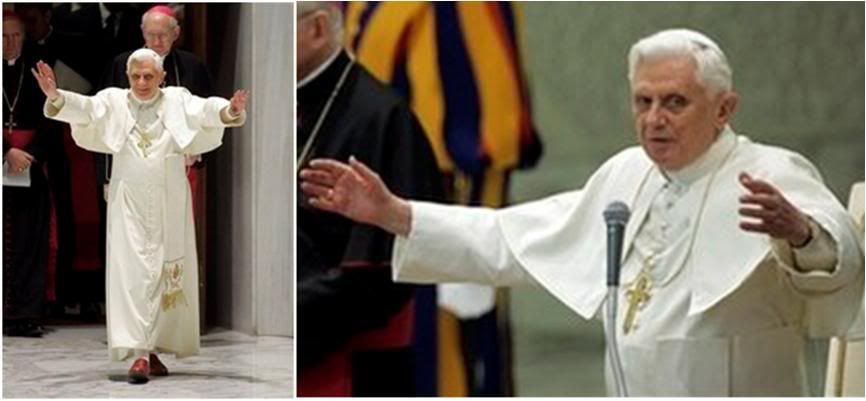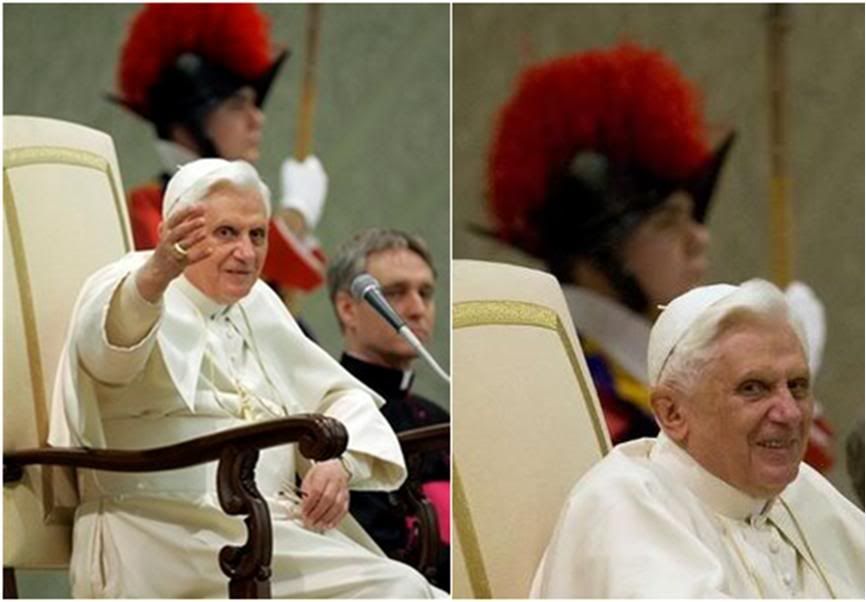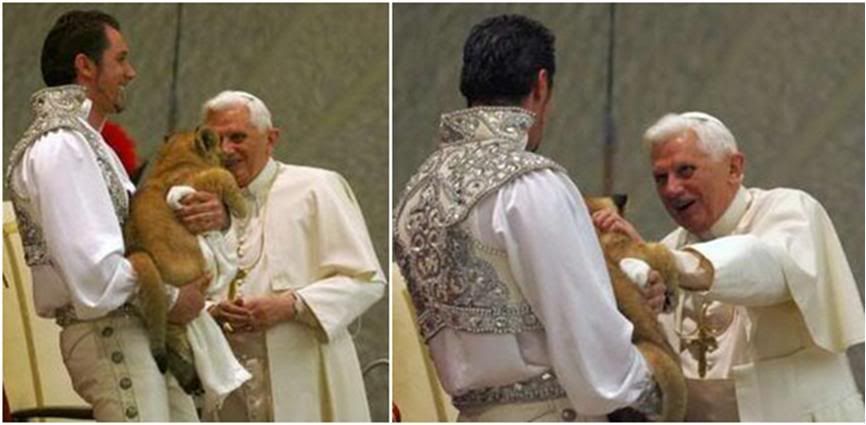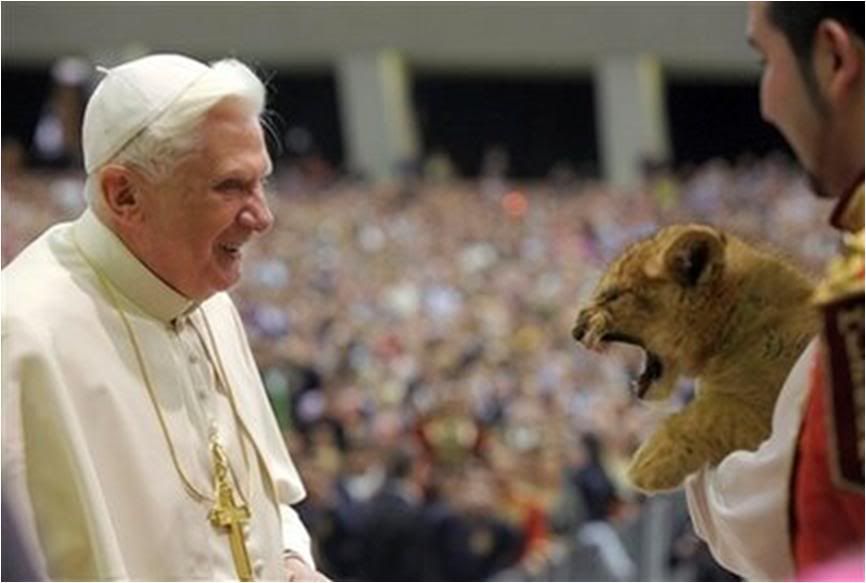 GENERAL AUDIENCE TODAY
GENERAL AUDIENCE TODAY
At the General Audience today, the Holy Father resumed his catechetical cycle on St. Paul, with reflections on the Apostle's letters to Timothy and Titus, his principal collaborators. Here is how he synthesized today's lesson in English:
In our catechesis on the writings of Saint Paul, we come now to the Pastoral Epistles, the two Letters addressed to Timothy and the one to Titus.
Although their authorship remains debated, these three Letters, while subsequent to the central years of Paul’s life and activity, clearly appeal to his authority and draw from his teaching.
Against threats to the purity of the apostolic tradition, they insist on a discerning understanding of the Scriptures and fidelity to the deposit of faith. Scripture and Tradition are seen as the "firm foundation laid by God" for the life of the Church (cf. 2 Tim 2:19), and the basis of her mission of leading all people to the knowledge of God’s saving truth (cf. 1 Tim 2:1-4).
The Pastoral Epistles also reflect the development of the Church’s ministerial structures, and in particular the emergence of the figure of the Bishop within the group of presbyters. They present the Church in very human terms as God’s household, a family in which the Bishop acts with the authority of a father.
Inspired by this vision, let us ask Saint Paul to help all Christians to live as members of God’s family, and their Pastors to be strong and loving fathers, committed to building up their flocks in faith and unity.
Before giving his final post-catechesis greeting to the faithful in Italian, he said he had three special messages to deliver. Here is a translation:
Before greeting the Italian-speaking pilgrims, I have three messages to communicate.
The first -
I learned with joy the news of the election of Metropolitan Kirill as the new Patriarch of Moscow and All the Russias. I invoke on him the light of the Holy Spirit for generous service to the Russian Orthodox Church, entrusting him to the special protection of the Mother of God.
The second -
In my homily on the occasion of the solemn inauguration of my Pontificate, I said that the 'call to unity' is the 'explicit' task of the Pastor.
Commenting on the Gospel passage on the miraculous catch of fish, I cited that "although there were so many (fish), the net was not torn” (Jn 21:11), continuing with the words: "Alas, beloved Lord, with sorrow we must now acknowledge that it has been torn! But no – we must not be sad! Let us rejoice because of your promise, which does not disappoint, and let us do all we can to pursue the path towards the unity you have promised... Do not allow your net to be torn, Lord, help us to be servants of unity!"
In compliance of this service of unity, which qualifies in a specific way my ministry as the Successor of Peter, I decided several days ago to grant the remission of the excommunication incurred by four bishops ordained in 1988 by Mons. Lefebvre without papal mandate.
I carried out this act of paternal mercy, because repeatedly, these prelates have shown their sincere suffering for the situation in which they were.
I hope that my gesture may be followed by their expeditious commitment to comply with further steps necessary to realize their full communion with the Church, by showing their true loyalty and true acknowledgment of the Magisterium and authority of the Pope and of the Second Vatican Council.
The third communication -
In these days when we commemorate the Shoah, I am reminded of the images gathered from my various visits to Auschwitz, one of the concentration camps where the brutal carnage of millions of Jews took place, innocent victims of blind racial and religious hatred.
Even as I renew with affection the expression of my full and indisputable solidarity with our brothers who were the beneficiaries of the First Alliance, I hope that the memory of the Shoah will lead mankind to reflect on the unpredictable power of evil when it conquers the heart of man.
May the Shoah be for everyone a warning against forgetting, against negation or reductionism, because violence committed against one single human being is a violence against all.
No man is an island, a famous poet wrote. May the Shoah teach both the old and new generations that only the effortful way of listening and dialog, of love and of forgiveness, can lead the peoples, cultures and religions of the world to the desired goal of brotherhood and peace in truth.
Never more should violence debase the dignity of man!

 Here is a translation of his entire catechesis
Here is a translation of his entire catechesis:
CATCHESIS #19
in the Pauline Year cycle
Dear brothers and sisters,
The last letters of the Pauline epistolary, about which I would like to talk today, have been called the Pastoral Letters, because they were sent to individual Pastors of the Church: two to Timothy and one to Titus, close collaborators of St. Paul.
In Timothy, the Apostle saw almost an alter ego: indeed, he entrusted him with important missions (to Macedonia: cfr At 19,22; to Thessalonia: cfr 1 Ts 3,6-7; to Corinth: cfr 1 Cor 4,17; 16,10-11), and later he would write a flattering eulogy: "I have no one with the same spirit as he, who will know how to concern himself at heart with the things that concern you" [My translation, for now, since the citation given is Phm 2,20, which is not the corresponding passage].
According to the Ecclesiastical History of Eusebius of Caesarea, from the 4th century, Timothy later became the first Bishop of Ephesus (cfr 1,4).
As for Titus, he too must have been very dear to the Apostle, who described him explicitly as "full of zeal... my companion and co-worker" (2 Cor 8,17.23), and even "my true child in our common faith" (Ti 1,4). He was charged with a couple of very sensitive missions to the Church of Corinth, the results of which encouraged Paul (cfr 2 Cor 7,6-7.13; 8,6).
Afterwards, when he was ordered to do so, Titus rejoined Paul at Nicopolis in Epirus, Greece cfr Tt 3,12), then was later sent to Dalmatia (cfr 2 Tm 4,10). At the time of the letter addressed to him, he was Bishop of Crete (cfr Tt 1,5).
The Letters addressed to these two Pastors occupy a very special place in the New Testament. Most exegetes now believe that these letters were not written by Paul himself, but that they come from 'the school of Paul", reflecting his legacy for a new generation, perhaps integrating some brief passage or words from the Apostle himself.
For example, some words from the Second Letter to Timothy seem so authentic that they could only have come from the heart and mouth of the Apostle himself.
Without a doubt, the ecclesiastical situation that emerges in these Letters is different from that during the central years of Paul's life. At that time, he described himself retrospectively as 'herald, apostle and teacher' of the pagans in faith and in truth (cfr 1 Tm 2,7; 2 Tm 1,11); He presented himself as someone who had obtained mercy because, as he wrote, "I was mercifully treated, so that in me, as the foremost, Christ Jesus might display all his patience as an example for those who would come to believe in him for everlasting life" (1 Tm 1,16).
Therefore, the essential thing was that in Paul - a persecutor converted in the presence of the Risen Lord - the Lord's magnanimity is an encouragement for us, to lead us to hope and to trust in the mercy of the Lord who, notwithstanding our smallness, is able to do great things.
Beyond the central years of Paul's life, new cultural contexts are also presupposed here [the letters to Timothy]. Indeed, there is an allusion to the emergence of teachings that were to be considered completely false and erroneous (cfr 1 Tm 4,1-2; 2 Tm 3,1-5), such as those that claimed matrimony was not a good thing (cfr 1 Tm 4,3a).
We see how modern that concern is, because even today, Scripture is sometimes read as an object of historical curiosity, and not as the word of the Holy Spirit, in which we can hear the voice of the Lord himself and recognize his presence in history.
We could say that the brief list of errors presented in the three letters anticipates some of the features of that subsequent erroneous orientation which went under the name of Gnosticism (cfr 1 Tm 2,5-6; 2 Tm 3,6-8).
The author confronts such doctrines with two basic recommendations. The first is to advise a spiritual reading of the Sacred Scripture (cfr 2 Tm 3,14-17), that is, a reading that considers it as truly 'inspired' and coming from the Holy Spirit, so that one may be instructed in salvation".
One reads Scripture correctly by placing oneself in conversation with the Holy Spirit, thereby obtaining light "for teaching, for refutation, for correction, and for training in righteousness" (2 Tm 3,16).
In this sense, the Letter adds: "so that one who belongs to God may be competent, equipped for every good work"(2 Tm 3,17).
The other reminder was to stress the good 'deposit' (parathéke): a special word in the pastoral Letters which refers to the tradition of apostolic faith that must be preserved with the help of the Holy Spirit who dwells in us.
This so-called 'deposit of faith' is to be considered as the sum of the apostolic tradition and as a criterion of faithfulness in announcing the Gospel.
We must also take into account that in the Pastoral Letters as in all of the New Testament, the term 'Scriptures' means explicitly the Old Testament, because the writings of the New Testament were either not written yet or were not yet part of the Scriptural canon.
Therefore, the Tradition of the apostolic announcement, this 'deposit', is the key for understanding Scripture, the New Testament. In this sense, Scripture and Tradition, Scripture and the apostolic teaching as interpretative key, are placed side by side, almost merging into each other to form together "God's solid foundation" (2 Tm 2,19).
The apostolic message, namely Tradition, is necessary to introduce us to an understanding of Scripture and to catch in it the voice of Christ. In fact, one must "hold fast to the true message [of faith] as taught" (Tt 1,9).
The basis of everything is precisely faith in the historical revelation of the goodness of God, who in Jesus Christ concretely manifested his 'love for all men", a love which in the original Greek text is significantly called 'phil-anthropy' [love of man] (Tt 3,4; cfr 2 Tm 1,9-10); God loves mankind.
Altogether, we can see that the Christian community was configuring itself in very clear terms, with an identity that not only keeps clear of incongruous interpretations, but affirms above all its own anchorage to the essential points of the faith, which here is synonymous to 'truth' (1 Tm 2,4.7; 4,3; 6,5; 2 Tm 2,15.18.25; 3,7.8; 4,4; Tt 1,1.14).
In faith is found the essential truth of who we are, who God is, how we should live. And the Church is defined as 'the pillar and foundation" (1 Tim 3,16) of this truth (the truth of faith).
In any case, she remains an open community, of universal breadth, who prays for all men of every order and rank, so that they may come to knowledge of the truth: "(God) wills everyone to be saved and to come to knowledge of the truth" that "Jesus Christ gave himself as ransom for all" (1 Tim 2,4-5).
Thus, the sense of universality, even if the communities were still small, was strong and determinative for these Letters. In addition, these Christian communities "slander no one" and "exercise all graciousness toward everyone" (Tt 3,2).
This is one important component of these Letters: universality and faith as truth, as a key to reading Sacred Scripture, of the Old Testament, thus delineating the unity of announcement and Scripture, and a faith open to everyone that bears witness to God's love for everyone.
Another typical component of these Letters is their reflection on the ministerial structure of the Church. They are the first to present her triple subdivision into bishops, priests and deacons (cfr 1 Tm 3,1-13; 4,13; 2 Tm 1,6; Tt 1,5-9).
We can observe in the Pastoral Letters the confluence of two different ministerial structures and thus, the constitution of the definite form of the Church ministry.
In the letters from the central years of his life, Paul speaks of 'bishops' (Phil 1,1) and of 'deacons': this was the typical structure of the Church as it took shape in the pagan world - in which the figure of the apostle remains dominant, and the other ministries developed gradually.
If, as mentioned, we had bishops and deacons in the Churches formed in the pagan world, and not priests, the latter were the dominant structure in the Churches that were formed in the Judaeo-Christian world.
At the end of the Pastoral Letters, the two structures are joined: thus appears 'the bishop' (cfr 1 Tm 3,2; Tt 1,7), always in the singular, and accompanied by the definite article - 'the bishop'. And beside the bishop, we find priests and deacons.
The figure of the Apostle was always determinative, but the three Letters, as I have said, were no longer addressed to communities but to individuals: Timothy and Titus, who on the one hand, appear as bishops, and on the other, start to take the place of the Apostle.
Thus we note initially the reality that will much later be called 'the apostolic succession'. Paul tells Timothy in very solemn tones: "Do not neglect the gift you have, which was conferred on you through the prophetic word with the imposition of hands on the presbyterate" 1 Tim 4, 14).
We can say that the words also mark the first appearance of the sacramental character of the ministry. And so we have the essential structure of the Catholic Church: Scripture and Tradition, Scripture and anouncement, forming an ensemble. But to this structure that we might call doctrinal, must be added the personal structure - the successors of the Apostles as witnesses to the apostolic message.
Finally it is important to note that in these Letters, the Church understands itself in very human terms, analogous to the home and the family. Particularly in 1 Tm 3,2-8, we can read very detailed instructions on the episcopate, such as these:
"A bishop must be irreproachable, married only once, temperate, self-controlled, decent, hospitable, able to teach, not a drunkard, not aggressive, but gentle, not contentious, not a lover of money.
"He must manage his own household well, keeping his children under control with perfect dignity, for if a man does not know how to manage his own household, how can he take care of the church of God?
"He should not be a recent convert, so that he may not become conceited and thus incur the devil's punishment. He must also have a good reputation among outsiders, so that he may not fall into disgrace, the devil's trap".
One must note above all the important attitude towards teaching (cfr also 1 Tm 5,17), which finds an echo in other passages (cfr 1 Tm 6,2c; 2 Tm 3,10; Tt 2,1), and then, a special personal characteristic, that of 'paternity'.
Indeed, the bishop is considered the father of the Christian community (cfr also 3 Tim 3,15). Moreover, the idea of the Church as 'house of God' has its roots in the Old Testament (cfr Nm 12,7), reformulated in Heb 3,2.6.
Whereas in other passages we read that all Christians are no longer strangers nor guests, but citizens alongside the saints and familiars of the House of God (cfr Eph 2,19).
Let us pray to the Lord and to St. Paul that we too, as Christians, may always distinguish ourselves, in relationship to the society in which we live, as members of the 'family of God'.
And let us pray as well that the pastors of the Church may always have paternal sentiments, at once tender and strong, in the formation of thw House of God, of the community, and of the Church.
Pope Benedict expresses
'full and indisputable solidarity'
with the Jews
By ALESSANDRA RIZZO

VATICAN CITY, Jan. 28 (AP)- Pope Benedict XVI on Wednesday expressed his "full and indisputable solidarity" with Jews and warned against any denial of the horror of the Holocaust.
With his comments, the Pope was reaching out to Jews angered by his recent decision to rehabilitate a bishop who says no Jews were gassed during the Holocaust.
"As I renew my full and indisputable solidarity with our brothers," Benedict said, "I wish that the memory of the Shoah will prompt humanity to reflect on the unpredictable power of evil when it conquers the hearts of men." Shoah is a Hebrew word for the Holocaust.
"May the Shoah be a warning to everyone against oblivion, denials or reductionism," the Pope told thousands of pilgrims at a weekly audience at the Vatican.
The Vatican had already distanced itself from comments by bishop Richard Williamson, a Briton who has denied that 6 million Jews were murdered during World War II. The Holy See said that removing the excommunication by no means implied the Vatican shared Williamson's views.
Wednesday's remarks were the first comments on the issue by the Pope himself since the controversy erupted.
The German-born Benedict recalled his visits to the Auschwitz concentration camp — including as pope in May 2006 — and the "brutal massacre of millions of Jews, innocent victims of blind racial and religious hatred."
Benedict lifted the excommunication of Williamson and three other bishops last week.
The four were excommunicated 20 years ago after they were consecrated by the late ultraconservative Archbishop Marcel Lefebvre without papal consent — a move the Vatican at the time called an act of schism.
Williamson said in an interview broadcast last week on Swedish state TV that historical evidence "is hugely against 6 million Jews having been deliberately gassed in gas chambers as a deliberate policy of Adolf Hitler."
He cited what he called the estimates of the "most serious" revisionists that "between 200,000-300,000 perished in Nazi concentration camps, but not one of them by gassing in a gas chamber."
Jewish groups, including the American Jewish Committee, the Simon Wiesenthal Center and Israel's quasi-governmental Jewish Agency, denounced the Vatican for bringing a Holocaust denier back into the fold.
Benedict made clear from the start of his pontificate that he wanted to reconcile with Lefebvre's rebellious traditionalist Society of St. Pius X.
Lefebvre bitterly opposed the teachings of the Second Vatican Council, the 1962-65 meetings that brought liberal reforms to the church.
Benedict said Wednesday he had lifted the excommunication because the bishops had "repeatedly shown their deep suffering over the situation."
Pope 'Pepperl' makes the acquaintance of a lion cub ('Hello, Kitty!') after a circus troupe performs some variety acts for him.
 OK, so it turns out 'Cubby' wan't quite the tame kitty he looked like in the first pictures, but our 'Pepperl' is unfazed:
OK, so it turns out 'Cubby' wan't quite the tame kitty he looked like in the first pictures, but our 'Pepperl' is unfazed:
 Lion cub greets Pope with a roar
Lion cub greets Pope with a roar

VATICAN CITY, Jan. 28 (AP) – Pope Benedict XVI was greeted by an unusual guest during his weekly audience at the Vatican: a feisty lion cub.
The beast was brought to the Pontiff in the Vatican's Paul VI hall on Wednesday as part of a performance by members of the Medrano Circus. An amused Benedict looked on as jugglers in sparkling costumes performed.
He got up when the lion cub was carried closer so he could pat it.
The lion's response: a roar, which drew laughter from the Vatican audience.